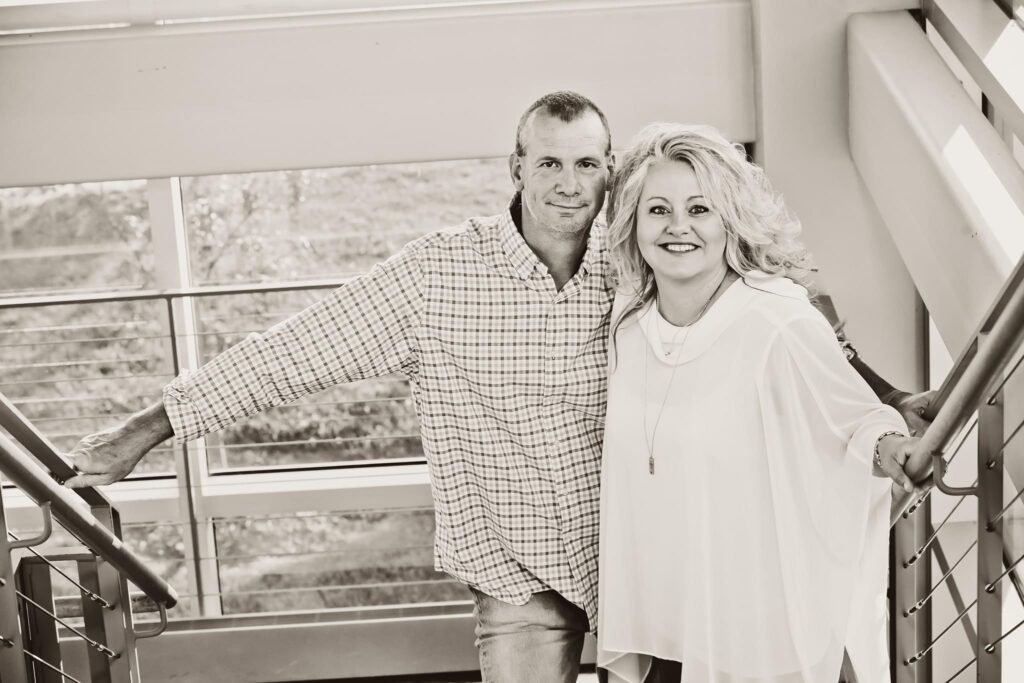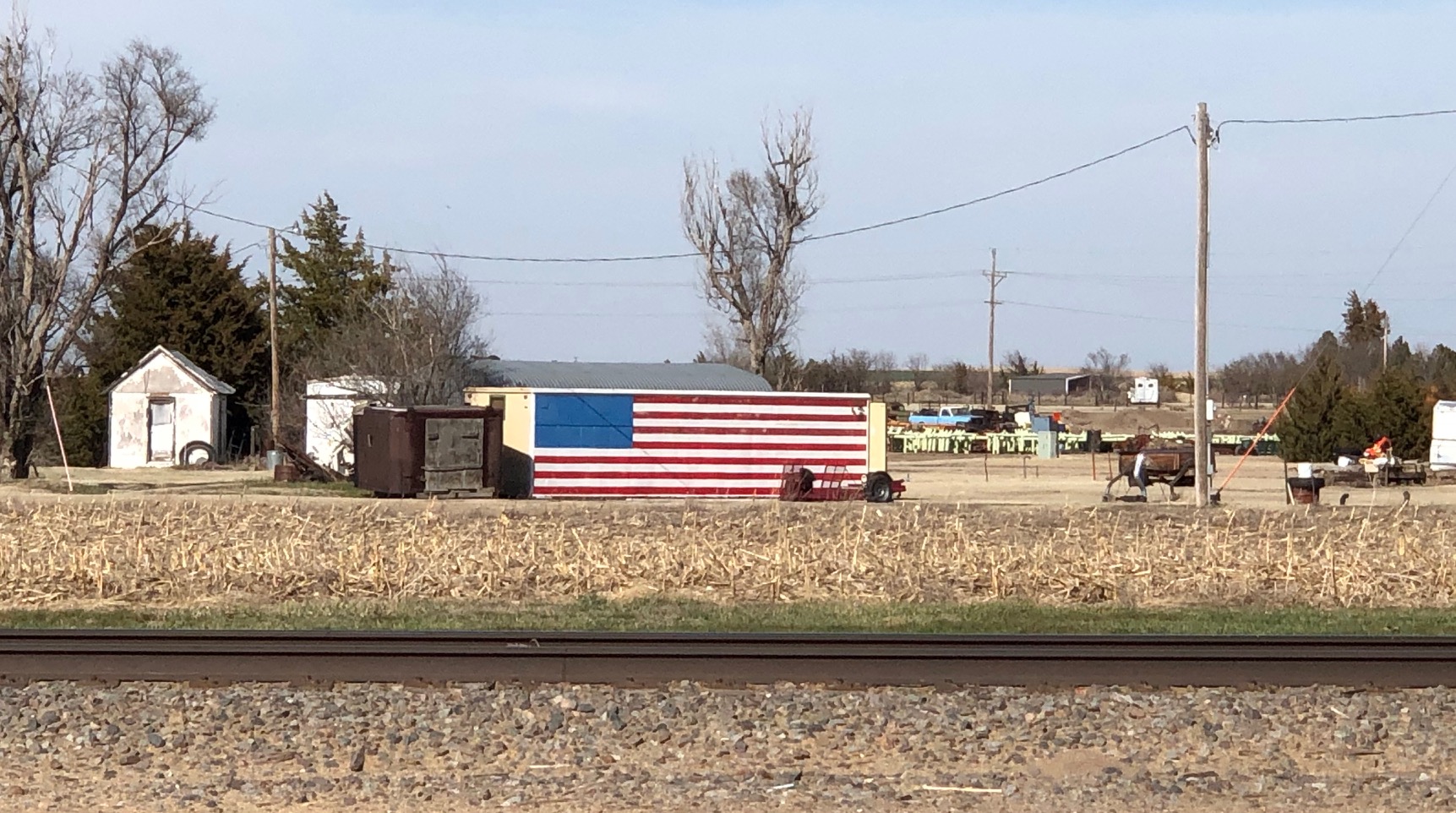In a Kansas Aging Farmland, Moving Toward the Middle and Leaving Grudges in the Dust

Earlier this week, I was driving my husband’s old suburban with our three dogs in the backseat. They were anxious for me to pull into my parents’ farm where they could get out and run to the pond, sniffing for birds. I was racking my brain on how to articulate the ever-evolving pulse of my hometown, very rural Gove County, Kansas, when a song came on the radio I hadn’t heard in a long time. The familiar words took my breath away: “I know how to hold a grudge, I can send a bridge up in smoke.” At first, I chuckled, thinking of the past 15-plus years of my life since I’ve returned home. “Ain’t that the truth,” I said aloud to myself and my dogs. As the dogs took off to chase whatever wildlife they could kick up, I thought about those old bridges from a decade ago.
Bridges often burned up because I have been known to have exploited the Kansas political divide, wanting to know more, do more, and be more effective, yet in an ineffective way. In the oldest ashes, where the bridges used to stand, you could find that I’d been too loud, too prideful, and ineffective in my advocacy efforts. Having spent a few years working in advocacy in Topeka, Kansas’ capital city, I thought I knew it all. I was professionally lobbying for additional funds and program enhancements to Home and Community Based Waivers. But personally, I was advocating against many hot topics common to Kansans: abortion, immigration, and many social programs that at that time I believed occurred at too high of a cost to taxpayers. I found myself surrounded by only like-minded advocates and I could hold a grudge with the best of them. The feeling “if you don’t agree, you’re wrong” fueled my efforts.
The song continues, “and I can’t count the people I’ve let down.” That, too, resonated. In my self-righteous efforts, I’d forgotten that so many Kansans were on the other side or had yet to form an opinion, and there I was, cutting them off because we didn’t agree, or that they were still formulating an opinion. How disappointing for them that instead of listening and sharing (and walking halfway across the bridge), I stood on my own side, heels dug in, incapable of compromise. To some, I might have been a champion, but to others, I was quite the opposite.
Wearing Dirt Like a Badge
“You ain’t gotta dig too deep if you wanna find some dirt on me,” Sammy Kershaw belts out in the fourth line of the first verse. And back then I sure wore that dirt every day, almost proudly. Today I’m often asked, “Why do you still talk about that time in your life, that isn’t who you are now?” Because that is who I am and how I’ve come to be, I need to own that. I was fierce in my personal beliefs and belligerent in how I pushed them. I am embarrassed, but I can’t pretend it wasn’t part of who I am and how I have become a different person.
Slowly, I grew afraid of the divide, and what its poison was doing to me and my heart. Standing beside me on my side at that time was a strong line of allies, but what I desperately needed contradicted what they were offering. My echo chamber was churning out what I’d been yelling to the other side for years: stubborn, self-righteous, allegiant, unswerving opinion — void of my own thoughts and experiences. If I saw or heard it on television, and if it seemed to align with the partisan movement de jour, I repeated it — over and over until I believed it. But it was just a narrative fueled by a nebulous, predatory system that was attempting to capitalize on the idea that it’s easier to conquer divided people. Until I was truly desperate for someone else to walk in my shoes, I didn’t understand the value of walking in anyone else’s.
The Change
If I can pick myself up and dust off the dirt (I was the most bull-headed type you’d see), then I believe we all can. It was a slow change. The once-hot flame of thinking I knew it all slowly burned out. Moving back home not only brought the welcome familiarity but also uncomfortable humility. The hardest place to look for fault is within, and I found a lot. I am living proof we can be better and do better — taking that first step toward the middle of the bridge. Through the eyes of the parent of a marginalized child, and the hands of a volunteer delivering emergency care to those with little to no resources, the voice I once used for causes that I swore I’d die for, suddenly fell silent. Who was I?
“I’m learning that who you’ve been ain’t who you’ve gotta be.” I realized you can’t play tug of war without someone at the other end of the rope. Both extreme sides of the divide recognize the middle as a truly dangerous place for people to be, compromise as a constant threat to their goals. Both pull their followers away from the middle, away from compromise, by questioning the efficacy of meeting halfway. Their end goal is for the rope to snap, leaving both sides falling backwards, staring blankly at the people on other side. Divided: that is when we become their easy prey.
Who are we if not the soldiers force-fed the narratives of our respective sides of the divide, constantly at odds with our neighbors? Am I shocked some days by the old lingering feelings and hate when something doesn’t go my way? Yes. When partisan news breaks, either thrilling or angering me, I feel the pull of the divide tempting me, to celebrate or scream. Sometimes I cry, well, a lot of times I cry, worried for those I love and causes I care about. Sometimes I rejoice. But I’ve learned the hard way that others have reactions very different from mine, and their loved ones and causes are important, too. When we forget that, we become deficient in compassion and deepen the divide.
“I ain’t as good as I’m gonna get”
I’m most proud of being an evolving Kansan. I am as country as they come, and I chose to come back home. Yes, on purpose. In my eyes, Kansans are the best people I’ve ever known, and we all need to continue to grow, especially me. In the past year, I have felt Kansans like myself yearn for common ground on many issues and many are working toward it.
Covid and its political fallout tore us apart. It made us all sad and long for the camaraderie we know we can achieve — the common ground of true Kansans. We are bigger than the two extremes; we recognize the power found in compromise. Embracing the power found in synergy, we can turn the corner just in time — before what is expected to be a polarizing election season.
Are we still on one side or the other? Most are yes, but I’m proud to see some walking toward the middle of the bridge. We are a work in progress.
Sometimes we need to look back to move forward. I used to work daily to deepen the divide. I worry that those efforts by both extremes will soon be ramping up. At the same time, I hope we can all find the strength to remember that we are Kansans first, and tools used as extensions of the extremes second. The reward to be found in common ground shall far surpass the fleeting victory found in an “all or nothing” trough we think we must drink from. We do not have to move that thought forward.
I will work hard to do that by listening better, representing myself with pleasant and kind delivery, and never forgetting that we don’t have to wear the same size shoe to walk in someone else’s. It may not fit quite right, it may be too loose or too tight, but I can sure learn a lot while taking those steps. I can learn that there is power in the middle, that compromise is not threatening, and that “I am better than I used to be.”
Ericka Nicholson was born and raised in rural Kansas. Her passion has always been advocating for rural Kansas, and she is particularly proud of her years lobbying in the Topeka State House for higher wages for home and community based waiver staff and health care workers. In 2010, Ericka returned to her hometown as the City Administrator. In addition to advocating for her own child and the rest of the LGBT community, Nicholson currently serves in an administrative role in her home county’s Critical Access Hospital, and as the President of the local Volunteer Ambulance Service.
